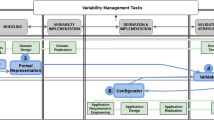Abstract
In practice, flexible processes often do not follow a fixed sequence of steps. Instead, process participants can rely on their knowledge and can decide for additional steps, change the execution order or skip a task. If a requirements engineer discusses such a process together with the stakeholders, variability has to be taken into account. The challenge is to translate the stakeholders’ explanations into a process model by asking the right questions. In order to cope with this problem, we propose the use of patterns. Patterns are a well-known way in systems engineering to describe solutions for frequently occurring problems. In this paper, we present the idea of business process variability patterns and give examples how they can be used in requirements and process analysis.
Access this chapter
Tax calculation will be finalised at checkout
Purchases are for personal use only
Similar content being viewed by others
References
Weber, B., Reichert, M., Rinderle-Ma, S.: Change patterns and change support features - enhancing flexibility in process-aware information systems. Data Knowl. Eng. 66(3), 438–466 (2008)
Thom, L.H., Reichert, M., Iochpe, C.: Activity patterns in process-aware information systems: basic concepts and empirical evidence. Int. J. Bus. Process Integr. Manage. 4(2), 93–110 (2009)
Kirchner, K., Malessa, C., Scheuerlein, H., Settmacher, U.: Experience from collaborative modeling of clinical pathways. In: Modellierung im Gesundheitswesen: Tagungsband des Workshops im Rahmen der Modellierung 2014, pp. 13–24 (2014)
van der Aalst, W.M.P., ter Hofstede, A.H.M., Kiepuszewski, B., Barros, A.: Workflow patterns. Distrib. Parallel Datab. 14(3), 5–51 (2003)
Staudt Lerner, B., Christov, S., Osterweil, L., Bendraou, R., Kannengiesser, U., Wise, A.: Exception handling patterns for process modeling. IEEE Trans. Softw. Eng. 36(2), 162–183 (2010)
Namiri, K., Stojanovic, N.: Pattern-based design and validation of business process compliance. In: Meersman, R., Tari, Z. (eds.) OTM 2007. LNCS, vol. 4803, pp. 59–76. Springer, Heidelberg (2007). https://doi.org/10.1007/978-3-540-76848-7_6
van der Aalst, W.M.P.: Re-engineering knock-out processes. Decis. Support Syst. 30(4), 451–468 (2001)
Garey, M.: Optimal task sequencing with precedence constraints. Discrete Math 37(4), 37–56 (1973)
Kirchner, K., Scheuerlein, H., Malessa, C., Krumnow, S., Herzberg, N., Krohn, K., Specht, M., Settmacher, U.: Was ein klinischer Pfad im Krankenhaus bringt. Evaluation klinischer Pfade am Uniklinikum Jena am Beispiel des PIGE-Projekts, Chirurgische Allgemeine Zeitung, 15(7+8), pp. 475–478 (2014)
Author information
Authors and Affiliations
Corresponding author
Editor information
Editors and Affiliations
Rights and permissions
Copyright information
© 2018 Springer International Publishing AG
About this paper
Cite this paper
Kirchner, K., Laue, R. (2018). Variability Patterns for Analyzing Flexible Processes. In: Teniente, E., Weidlich, M. (eds) Business Process Management Workshops. BPM 2017. Lecture Notes in Business Information Processing, vol 308. Springer, Cham. https://doi.org/10.1007/978-3-319-74030-0_49
Download citation
DOI: https://doi.org/10.1007/978-3-319-74030-0_49
Published:
Publisher Name: Springer, Cham
Print ISBN: 978-3-319-74029-4
Online ISBN: 978-3-319-74030-0
eBook Packages: Computer ScienceComputer Science (R0)




